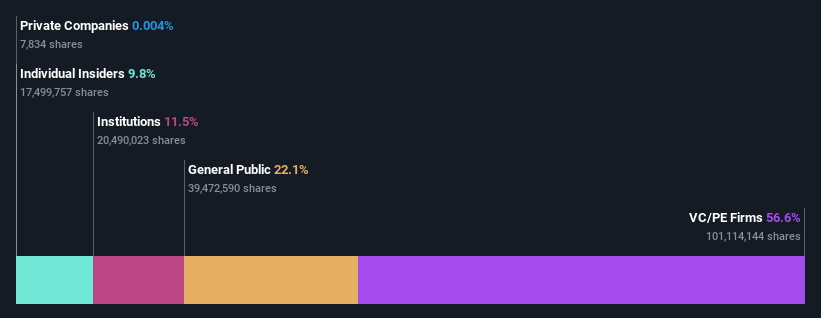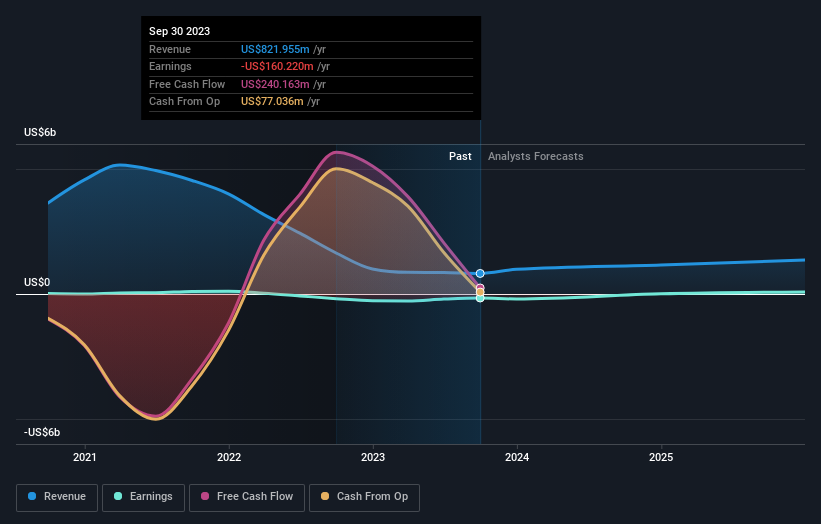Key Insights
-
loanDepot’s significant private equity firms ownership suggests that the key decisions are influenced by shareholders from the larger public
-
PCP Managers, L.P. owns 57% of the company
A look at the shareholders of loanDepot, Inc. (NYSE:LDI) can tell us which group is most powerful. And the group that holds the biggest piece of the pie are private equity firms with 57% ownership. Put another way, the group faces the maximum upside potential (or downside risk).
Clearly, private equity firms benefitted the most after the company’s market cap rose by US$61m last week.
Let’s delve deeper into each type of owner of loanDepot, beginning with the chart below.
View our latest analysis for loanDepot
What Does The Institutional Ownership Tell Us About loanDepot?
Institutions typically measure themselves against a benchmark when reporting to their own investors, so they often become more enthusiastic about a stock once it’s included in a major index. We would expect most companies to have some institutions on the register, especially if they are growing.
We can see that loanDepot does have institutional investors; and they hold a good portion of the company’s stock. This can indicate that the company has a certain degree of credibility in the investment community. However, it is best to be wary of relying on the supposed validation that comes with institutional investors. They too, get it wrong sometimes. It is not uncommon to see a big share price drop if two large institutional investors try to sell out of a stock at the same time. So it is worth checking the past earnings trajectory of loanDepot, (below). Of course, keep in mind that there are other factors to consider, too.
We note that hedge funds don’t have a meaningful investment in loanDepot. PCP Managers, L.P. is currently the company’s largest shareholder with 57% of shares outstanding. This essentially means that they have extensive influence, if not outright control, over the future of the corporation. With 3.4% and 3.0% of the shares outstanding respectively, Jeffrey DerGurahian and Cannell Capital LLC are the second and third largest shareholders. Jeffrey DerGurahian, who is the second-largest shareholder, also happens to hold the title of Chief Investment Officer.
While studying institutional ownership for a company can add value to your research, it is also a good practice to research analyst recommendations to get a deeper understand of a stock’s expected performance. There are plenty of analysts covering the stock, so it might be worth seeing what they are forecasting, too.
Insider Ownership Of loanDepot
While the precise definition of an insider can be subjective, almost everyone considers board members to be insiders. Management ultimately answers to the board. However, it is not uncommon for managers to be executive board members, especially if they are a founder or the CEO.
I generally consider insider ownership to be a good thing. However, on some occasions it makes it more difficult for other shareholders to hold the board accountable for decisions.
We can report that insiders do own shares in loanDepot, Inc.. In their own names, insiders own US$94m worth of stock in the US$963m company. Some would say this shows alignment of interests between shareholders and the board. But it might be worth checking if those insiders have been selling.
General Public Ownership
The general public, who are usually individual investors, hold a 22% stake in loanDepot. While this group can’t necessarily call the shots, it can certainly have a real influence on how the company is run.
Private Equity Ownership
With a stake of 57%, private equity firms could influence the loanDepot board. Some might like this, because private equity are sometimes activists who hold management accountable. But other times, private equity is selling out, having taking the company public.
Next Steps:
It’s always worth thinking about the different groups who own shares in a company. But to understand loanDepot better, we need to consider many other factors. Case in point: We’ve spotted 2 warning signs for loanDepot you should be aware of.
Ultimately the future is most important. You can access this free report on analyst forecasts for the company.
NB: Figures in this article are calculated using data from the last twelve months, which refer to the 12-month period ending on the last date of the month the financial statement is dated. This may not be consistent with full year annual report figures.
Have feedback on this article? Concerned about the content? Get in touch with us directly. Alternatively, email editorial-team (at) simplywallst.com.
This article by Simply Wall St is general in nature. We provide commentary based on historical data and analyst forecasts only using an unbiased methodology and our articles are not intended to be financial advice. It does not constitute a recommendation to buy or sell any stock, and does not take account of your objectives, or your financial situation. We aim to bring you long-term focused analysis driven by fundamental data. Note that our analysis may not factor in the latest price-sensitive company announcements or qualitative material. Simply Wall St has no position in any stocks mentioned.






